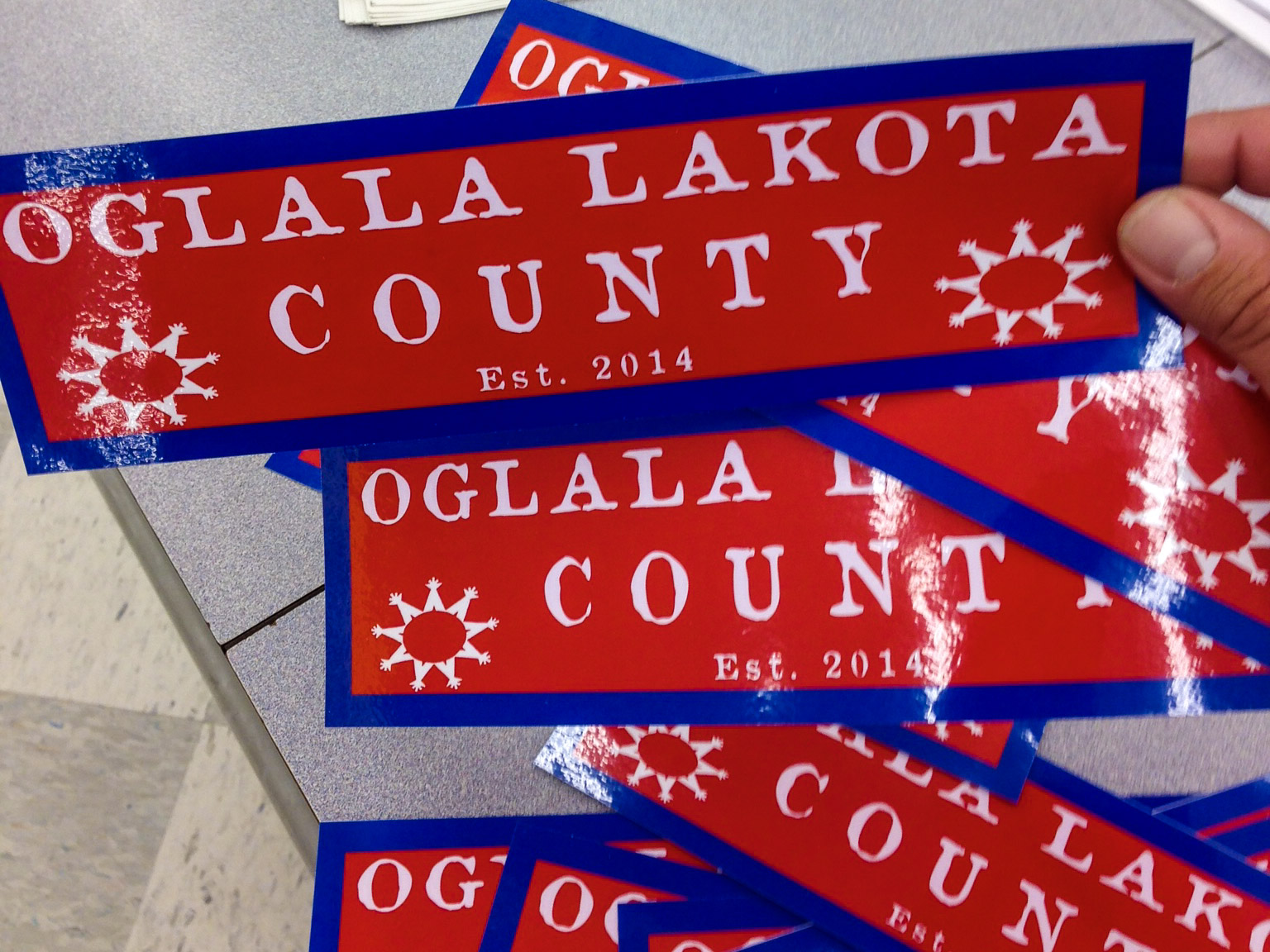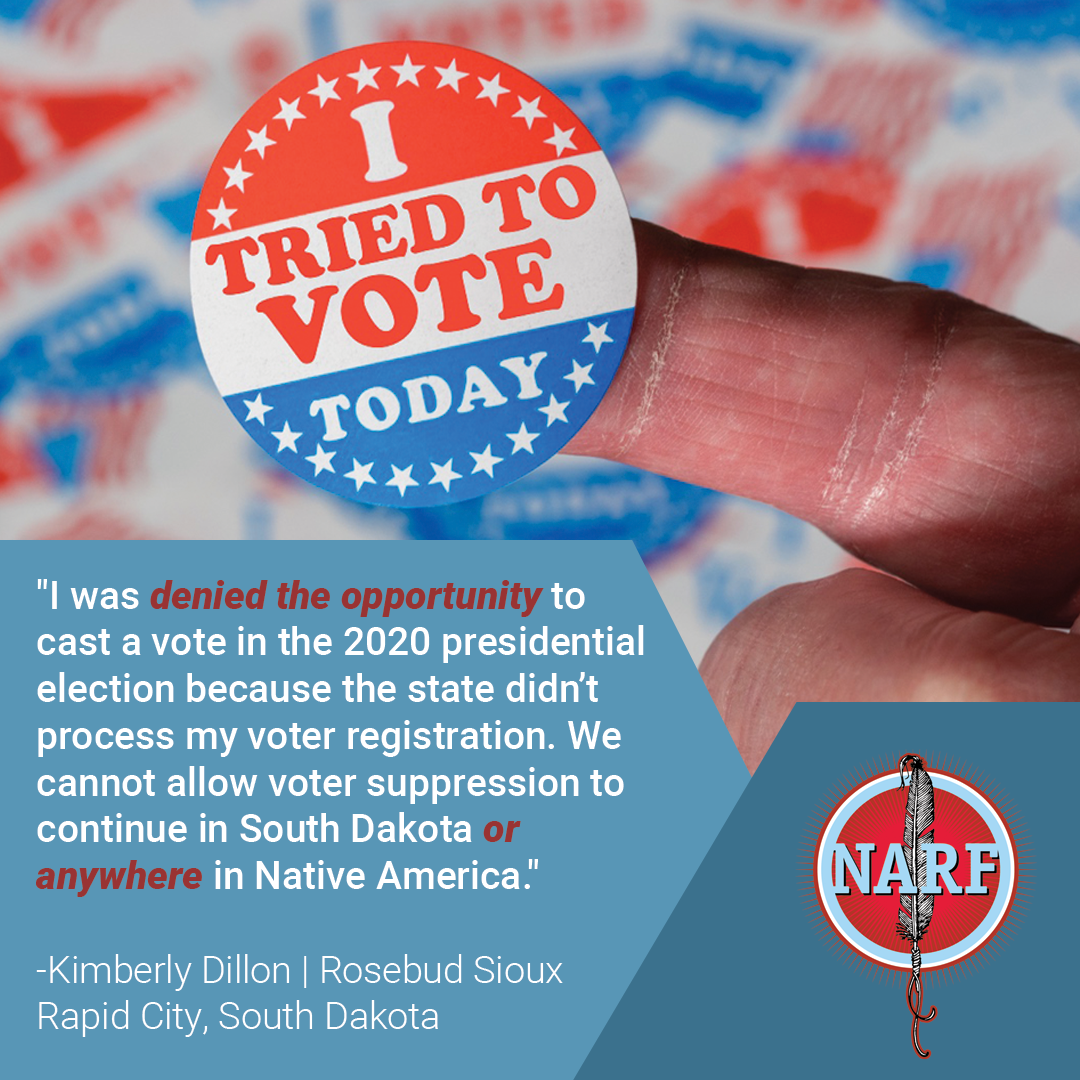Indianz.Com > News > Tribes and tribal citizens accuse South Dakota of violating voting laws

Tribes and tribal citizens accuse South Dakota of violating voting laws
Friday, July 9, 2021
Indianz.Com
Two new individual plaintiffs and the Lakota People’s Law Project have joined the Oglala Sioux and Rosebud Sioux tribes in suing the state of South Dakota, claiming state officials have routinely violated a federal law that requires states to help their citizens register to vote.
The Lakota People’s Law Project, Rosebud Sioux tribal citizen Kimberly Dillon and Standing Rock Sioux tribal citizen Hoksila White Mountain have joined the two Sioux tribes in a lawsuit that was filed in September 2020, according to an amended filing submitted to the U.S. District Court Thursday by legal firms the Native American Rights Fund and Demos.
The lawsuit alleges South Dakota state officials and employees have violated the National Voter Registration Act, also known as Motor-Voter, which requires states to help register citizens to vote through the Department of Motor Vehicles and other state-run public assistance agencies.
“With this suit, Native American voters seek to ensure that the American freedom to vote is not restricted by negligent actions by the state of South Dakota,” said Oglala Sioux Tribe President Kevin Killer.
South Dakota has a long and troubled history of disenfranchising Native American voters. In violation of the Indian Citizenship Act of 1924, South Dakota prevented Native people from voting until the 1940s. In 1984, the county auditor in Fall River, which includes part of the Pine Ridge Reservation, refused to accept voter registrations from Native American citizens, according to the lawsuit. “Native voters in South Dakota have found it harder and harder to perform the simple act of registering to vote. As the number of registered voters plummets, the state has done nothing to fix this systemic problem,” said Rosebud Sioux Tribe President Rodney M. Bordeaux. According to the lawsuit, between the 2004 and 2016 elections, South Dakota saw an 84 percent decrease in the number of voter registration applications from public assistance agencies, despite an 80 percent increase in people receiving benefits from those agencies. In 2004, up to 13 percent of those receiving food assistance benefits also received voter registration assistance. By 2016, that number had fallen to just over 1 percent. According to the lawsuit, state officials also have failed to make it easier for Native residents to acquire state identification cards or access polling places. For example, though about 90 percent of the population of Buffalo County lives on the Crow Creek Reservation, to register to vote, reservation residents must drive as far as 90 miles round trip to Gann Valley — populated only by about a dozen residents, all non-Native. “The state is aware that many of our people lack the transportation and means to travel to faraway polls, yet they do nothing,” Bordeaux said. “The state’s inactions to address registration and polling barriers minimize the impact our votes could have, and we cannot let them get away with it.” Natives living on the Rosebud Sioux Reservation in South Dakota have to drive an average of nearly 45 miles to obtain a state ID, compared to about 17 miles for non-Natives, according to the lawsuit. South Dakota counties have even chosen to forgo federal funding rather than service Native voters. Jackson County refused to use federal Help America Vote Act funding to create a satellite polling office in Wanblee on the Pine Ridge Reservation, until forced to do so by a federal lawsuit. “As Black, brown, and Native communities across the country face a racist push to undermine the basic freedom to vote, South Dakota must live up to its obligations under the National Voter Registration Act — a critical federal voting rights protection that has helped millions of Americans get on the voting rolls over the past 30 years,” said Adam Lioz, senior counsel for Demos.BREAKING: The U.S. Supreme Court released a decision in Brnovich v. DNC that prioritized disproven election concerns over the very real Native and minority voters that lose their voice due to discriminatory policies: https://t.co/bs5HPVvesU #votingdiscrimination #votinglaws pic.twitter.com/M07jJt5SNU
— Native American Rights Fund (@NDNrights) July 1, 2021
Search
Filed Under
Tags
More Headlines
Native America Calling: Can the right approach close the Native immunization gap?
Cronkite News: Long COVID cases remain high in Arizona
Native America Calling: Eyes in the sky for development, public safety, and recreation
Native America Calling: Three new films offer diverse views of Native life
NAFOA: 5 Things You Need to Know this Week
Chuck Hoskin: Cherokee Nation works toward cure for arthritis
Native America Calling: Protecting young people from the down sides of social media
Cronkite News: Fake ‘shaman’ among candidates failing to make Congressional ballot
Native America Calling: New Native voices in poetry
Cronkite News: Tribes air concerns about border at hearing in nation’s capital
Native America Calling: Indiginerds descend on Oklahoma City
Native America Calling: Political leaders target tribes with unfounded claims
Cronkite News: First Native woman in space shares unique journey
Native America Calling: Tackling a troubling trend for Native women in prison
Chuck Hoskin: Cherokee Nation safeguards our Native language
More Headlines
Cronkite News: Long COVID cases remain high in Arizona
Native America Calling: Eyes in the sky for development, public safety, and recreation
Native America Calling: Three new films offer diverse views of Native life
NAFOA: 5 Things You Need to Know this Week
Chuck Hoskin: Cherokee Nation works toward cure for arthritis
Native America Calling: Protecting young people from the down sides of social media
Cronkite News: Fake ‘shaman’ among candidates failing to make Congressional ballot
Native America Calling: New Native voices in poetry
Cronkite News: Tribes air concerns about border at hearing in nation’s capital
Native America Calling: Indiginerds descend on Oklahoma City
Native America Calling: Political leaders target tribes with unfounded claims
Cronkite News: First Native woman in space shares unique journey
Native America Calling: Tackling a troubling trend for Native women in prison
Chuck Hoskin: Cherokee Nation safeguards our Native language
More Headlines
